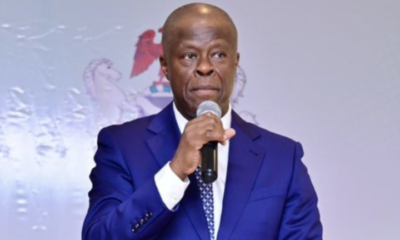Business
Mile One Market Traders Hail Markets Reopening

Traders at the Rumuwoji Market, popularly known as Mile One Market, have commended the Rivers State Governor, Chief Nyesom Wike, over the reopening of markets across the state on account of the COVID-19 Pandemic.
The traders, who expressed satisfaction over the bounce back to business after four months of staying at home.
A shop owner in the market, Mrs Christiana George, who could not contain her joy told The Tide that life was tough for her family as her husband passed away in the midst of the pandemic and could not also be intered for lack of funds, noting that with the markets now open, plans could now be made for the interment.
Many of the traders who were seen cleaning their shops and sorting their wares, lamented that most of their stock had expired due to the unceremonious shutdown of the markets in the state. A grocery shop owner in the Mile One Market, Mrs Esther Onugna, while thanking Goveronr Nysom Wike for reopening the markets, regretted that nearly all her wares had either expired or mouldered due to the shut down for more than four months.
Onugha appealed to the government for some sort of grant to enable them restock and get back into business fully.
Meanwhile, chairman of the Mile Market Traders Association, Mr Ndubueze Enyiche, pledged the traders preparedness to support the state government in the fight against the deadly virus, adding that the traders would adhere to the COVID-19 containment protocol in the market.
Enyiche stated that the traders association would put in place a taskforce that would ensure the implementation of the prevention protocol, particularly the “no face mask no entry” protocol.
He apologized for the poor compliance level, attributing it to the fact that it was the first day that markets were reopened Tuesday after almost five months of being shutdown.
Also speaking, the state coordinator, of the risk communication and community Engagement Team for Covid-19, and one of the Pillars of the Covid-19 Rapid Responses Team, Mr Olowale Mordicai who was monitory the compliance levels in the markets, frowned at the low level of compliance in the market, observing that it was an indication that they were not prepared to have the markets.
Mordicai, charged them to not disappoint the governor by stepping up their level of compliance.
On his part, the General Manager, Rivers State Rural Water Supply and Sanitation Agency, Mrs Napoleon Adah, who was also part of the monitoring teams warned the traders that defaulters would be sanctioned, and charged if they donot comply with the Covid-19 provocation protocol to protect themselves and their families.
Wash buckets were seen at the entry points of the market with the union members were enforcing the use of facemask and hand wash before entry.
Recall that the Rivers State Governor had on Monday, in a statewide broad cast announce the reopening of markets, across the state, which were shutdown at the outset of the corona virus pandemic in the state.
Tonye Nria-Dappa
Business
Bank Supports Female Entrepreneurs With Grants
Kolomoni Microfinance Bank has awarded grants to five female entrepreneurs to boost their businesses as part of its commitment to promoting women in business.
The initiative, organized to mark International Women’s Day, was themed “Accelerate Her Growth.”
According to the bank, the decision to support women was inspired by World Bank data, which shows that 41 percent of Nigeria’s micro-businesses are owned by women.
Delivering the keynote address, business strategist, Ebun Akinwale, emphasized that entrepreneurship requires resilience, creativity, and passion.
She illustrated this by recounting her own business challenges and highlighting the critical role passion plays in overcoming obstacles.
The event underscored Kolomoni’s mission to empower women and support small businesses in Nigeria.
Other speakers at the occasion were Odunayo Oyebolu, a seasoned entrepreneur; Victori Ajiboye, a marketing strategist with global experience; and Simi Ojumu, a finance expert.
The beneficiaries said the financial support was a validation of their hard work and a boost of confidence towards scaling through in their businesses.
The winners were selected after sharing their entrepreneurial journeys and presenting business proposals for financial assistance from the bank.
Business
Nigerian SME Awards: Providus, Access, Others Compete For Honor
The 8th edition of the Nigeria Small and Medium Enterprises (SMEs) Summit and Awards (Nigeria SMEAwards) is set to take place in Lagos for the first time in its history, marking a significant milestone for this prestigious event.
Endorsed by the Small and Medium Enterprises Development Agency of Nigeria (SMEDAN), the annual awards celebrate the entrepreneurial spirit driving Nigeria’s economy.
The visionary convener of NigeriaSMEAwards 2025, Adedayo Olalekan, said, “Governors from Zamfara, Sokoto, Ebonyi, Borno, Enugu, Ekiti, Benue, and Kaduna States have all implemented transformative initiatives that have greatly benefitted local enterprises.
“Their contributions will serve as a beacon of inspiration for the nation.”
Speaking at a recent press conference in Lagos, Olalekan emphasised that the event would introduce a fresh and unique approach, moving away from tradition.
“Despite economic challenges, Nigerians continue to show an unwavering commitment to progress”, he said.
He noted that the awards will not only honor outstanding individuals, but also recognise the critical role state governments play in nurturing vibrant SMEs.
“State governments have been instrumental in fostering a supportive environment for SMEs, which in turn benefits both the awardees and the larger economy.
“With major banks like Providus, Access, and First Banks competing for top honors, the 8th NigeriaSMEAwards promises to be a night of celebration, recognising exceptional contributions to Nigeria’s SME landscape”, Olalekan added.
Amid global challenges such as inflation, geopolitical instability, and the ongoing conflict in Ukraine, Nigerians continue to show remarkable resilience.
Their efforts, according to reports, have contributed to job creation, economic growth, and overall prosperity, with SMEs at the forefront of this success.
This year’s awards will recognise governors who have made significant strides in advancing the SME sector within their states.
Business
SMEs Experts Urge MSMEs To Remain Focused
Small and Medium Enterprises (SMEs) consultants in Rivers State have called on entrepreneurs to be focused and avoid distractions.
The experts, who were speaking on the recent developments about the change of leadership in the state, said entrepreneurs need to put more efforts in their businesses in order to break even in the present situation in Rivers State.
Speaking in a chat with The Tide, an international SMEs consultant, Amb. Larry Goodwill Ajiola, said the political moves is capable of distracting SMEs who are not grounded in their businesses, adding that “the serious minded business men and women would utilise the opportunity to increase their revenues”.
Amb Ajiola, who is the President and Chief Executive Officer (CEO) of Rumuomasi Co-operative and Credit Society Limited, Port Harcourt, said, “Rugged entrepreneurs look out for business opportunities in situations around them, whether good or bad”.
He reiterated that the loan facility given to 3,000 SMEs in the state revived and expanded businesses, adding that the empowered businesses should continue to push, no matter the situation.
“credit is a powerful tool for achieving financial security.
“We can only keep imagin the economic value that the over 3,000 MSMEs would add to the positive economic dynamics of Rivers State and the Local Government Areas in terms of Gross Domestic Prooduct (GDP), increased tax returns, employment creation, income distribution, and production of goods and services”, he said.
Another SMEs Expert, a business consultant and SMEs trainer, Mr. Chisom Sam-Orji, in his advice, noted that every SME in the state should realize that change is the only constant thing.
He said SMEs should also know that “tough times never last, but tough people do”, adding the need for every entrepreneur to stay focused on creating value and remain resilient.
“This is not the time to be distracted by every noise around your space, but to maximize every time you have to focus on the essentials and keep creating value.
“For some people, it may just be the time to diversify, create new products and services to serve a new or existing market. But this must be based on the facts available to you via research and market surveys”, he said.
The SMEs expert also said the present time in the life of an entrepreneur is a time to cut off unnecessary excesses that surround one’s business.
“Those extra costs that may hamper your growth in this season and beyond, and focus on just essentials.
“SMEs should find certain leverages that are available to aid their business growth. This could be in form of grants, knowledge, and other leverage tools.
“Collaboration is one big way to grow in this season. Finding ways to collaborate with like minds instead of competing could enable a product or service gain advantage in the market and beyond.
“They should also find ways to sustain and grow their customer relationship as this is key to sustaining business flow. They must seek new and efficient ways to serve their customers and gain their loyalty”, he stated.
He further called on every entrepreneur to keep building capacity and never take their eyes off their visions, adding the need to muster every courage it takes to keep building and moving forward.
Lilian Peters
-
Nation4 days ago
Military Committed To Supporting Sustainable Food Security In Nigeria – CDS
-

 News4 days ago
News4 days agoRivers HoS Resigns As Ibas Appoints New SSG
-
Politics4 days ago
PDP Govs Congratulate Jonathan Over Sunhak Peace Prize
-

 Featured4 days ago
Featured4 days agoBring Your Wealth Of Experience To Governance, Ibas Tasks New SSG
-
Business4 days ago
SMEs Experts Urge MSMEs To Remain Focused
-
Nation4 days ago
South East Caucus Kicks As Senate Rejects Nwosu’s Immortalisation
-

 News4 days ago
News4 days agoNigeria’s Economy Achieving Stability – Edun
-
Politics4 days ago
Anyaoku, Yakasai, Osoba, Agbakoba, Others To Meet NASS Over New Constitution

